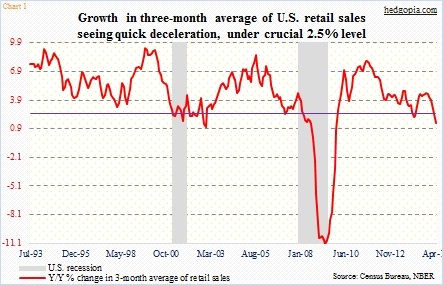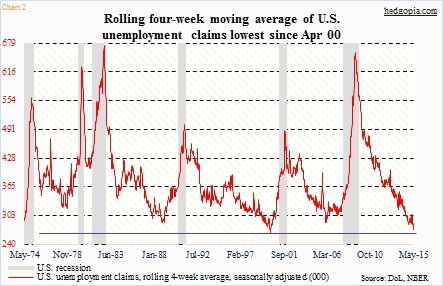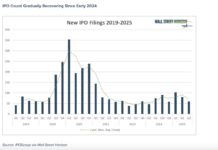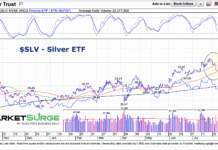The U.S. economy continues to churn out mixed messages.
The retail sales number on Wednesday was an outright dud. Sales in April were flat month-over-month, against expectations for a 0.2-percent gain. With that, sales are now down to flat in four of the last five months.
Sales peaked at $441.4 billion last November, and were $436.8 billion in April. The three-month average has been decelerating since last December, with year-over-year growth having decelerated from 4.7 percent last October to 1.5 percent in April. Going back over two decades, which covers two recessions, the 2.5 percent mark has proven to be an important level, and we are currently below that (see chart above).
We already knew how weak the first quarter was, as real GDP only grew 0.2 percent. This was the first estimate. New data continue to come in, and based on that, 1Q real GDP estimate has gone negative. The consensus continues to expect growth of three-plus percent in the second quarter, but the Atlanta Fed’s GDPNow is forecasting 0.7 percent growth (as of May 13th).
And then there are unemployment claims.
They portray a totally different picture. In the latest reporting period (as of May 9th), seasonally-adjusted initial claims were 264,000, down 1,000 over the prior week. For the third straight week, claims have remained below 270,000. Going back to 1973, this is only the second time this has happened. The last time claims were this low was 2000 (bottomed at 259,000 mid-April that year).
Depending on who is looking – macro optimist or pessimist – there is good news and bad news in the unemployment claims data.
Historically, as can be seen in the chart above, unemployment claims do not trough in the midst of a recession. But once they do and start rising, sooner or later, the economy contracts.
If this phenomenon plays out again, then we have to wonder if this is as low as claims can go. After all, 15 years ago, they started rising from around these levels. Having said that, back in 1972-73, unemployment claims remained under 300,000 for an extended period of time, before bottoming in the latter months of 1973. The economy went into a recession in 1974. This time around, claims have remained under 300,000 since last September, except for a few weeks.
The attempt here is not to suggest that we are headed for a recession. Who knows anyway? We will leave that up to economists. But if macro data do not begin to improve soon, the claims data could very well be at an inflection point.
Thanks for reading.
Follow Paban On Twitter: @Hedgopia
Any opinions expressed herein are solely those of the author, and do not in any way represent the views or opinions of any other person or entity.










